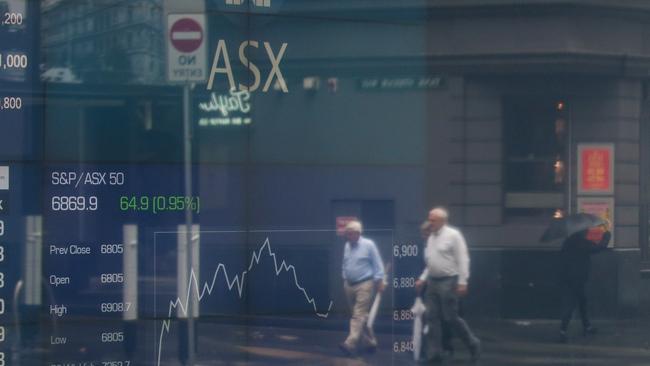Rising rates, inflation a concern for investors as ASX ends week on positive note
Another volatile week for shares ended on a positive note, but the jitters over rising inflation and interest rates are set to linger.

Another volatile week for shares ended on a positive note, but the jitters over rising inflation and interest rates which hit the retail and building materials sectors this week are set to linger.
Australia’s S&P/ASX 200 share index rose 1.2 per cent to 7145.6 points on Friday as futures pointed to a 0.9 per cent rise in the S&P 500, a move which would suggest another short-term bottom.
That came after worrisome midweek falls when reports from major US retailers showed ballooning costs and slowing sales were crimping earnings just as the Federal Reserve was starting to unwind its emergency interest rate settings. The S&P 500 fell 4 per cent on Wednesday night in its worst day in almost two years.
The US retailer sell-off spilt over to the Australian market on Thursday, with Wesfarmers, down 7.8 per cent, Woolworths down 5.6 per cent, Metcash down 6.5 per cent and JB Hi-Fi down 6.6 per cent.
But while the S&P 500 did fall to a fresh 14-month low close on Friday, the sell-off lost momentum and volatility cooled slightly as the US benchmark neared the “bear market” threshold of 3834.8.
At that point it would have been down 20 per cent from the record of 4793.5 it reached in January.
Amid heightened focus on cost inflation after a major profit warning from Boral and disappointing results from giant US retailers including Walmart, Lowe’s and Target, UBS Australia equity strategist, Richard Schellbach assessed the risk of margin compression for ASX-listed companies.
Mr Schellbach found that the stocks most at risk of margin compression hitting their profits were mostly concentrated in the building materials and food production sectors.
However, margin risk analysis was ultimately a “stock-by-stock story”.
It’s another reminder of why 2022 should tend to favour active versus passive investing in the share market as the emergency interest rate settings that “lifted all boats” finally starts to be unwound.
The ASX-listed companies which UBS analysts are most concerned about in terms of the challenge of passing cost inflation on to their customers include Adbri, AMA Group, Brickworks, Boral, Costa Group, Collins Foods, Inghams, Kogan.com and Redbubble.
A number of these companies have delivered a string of downgrades in recent months.
“Despite the headwinds these stocks face, we note that, on average, this group of 19 stocks is still generating EBIT margins in excess of mid-cycle, while sitting on price-to-earnings multiples at a premium to both the market and their historical range,” Mr Schellbach warned.
Freight and shipping costs were most commonly cited as a current input cost concern.
Rising prices of oil and agricultural products were also having a meaningful impact on operations.
But while businesses faced record levels of cost inflation, the picture so far suggests that margins are broadly being maintained, according to Mr Schellbach.
“Over the last 18 months, the pricing power beta measure has been showing that companies are upping their sales prices comfortably, even as they report intensifying input costs,” he said.
A strong macroeconomic backdrop, including the unemployment rate hitting a 48-year low of 3.9 per cent in April, was still allowing costs to be passed on and companies were mostly confident.
“Through the February reporting season and over recent months, we have noticed that companies are still willing to pass through costs to customers due to strong underlying demand,” Mr Schellbach said. “The ability of companies to pass on costs when the economy is strong makes sense, given that both consumers and businesses are flush with cash, and able to spend. Companies continue to emphasise the comparative advantage they have to weather input costs pressures versus their peers and see the current environment as an opportunity to pick up market share.
But “recently, this measure has begun to lose momentum, with this likely a product of a maturing cycle whereby the period of peak upward margin cyclicality has passed.”
In contrast to many offshore markets, soaring semiconductor prices weren’t a widespread concern for Australian companies, albeit that was behind a profit warning from Eagers this week.
The Australian Energy and Information Technology sectors were seen as being the most able to fully pass on their cost inflation, according to UBS.
“Not surprisingly, these sectors are also seen as being able to adjust their selling prices almost immediately in response to rising costs,” Mr Schellbach said.
It came as Westpac’s highly-regarded chief economist, Bill Evans, said a bigger interest rate hike of 40 basis points by the Reserve Bank next month was “still the best policy”.
In his view a slightly disappointing headline number from this week’s wage price index report was “unlikely to sway the Board from its policy approach.”
Mr Evans that minutes from the RBA’s May board meeting highlighted that the Board is taking a much broader approach to assessing wage pressures than just relying on the Wage Price Index.
“We continue to argue that the best policy option for June is to go by 40 basis points early in this tightening cycle to avoid falling behind the curve,” Mr Evans said.




To join the conversation, please log in. Don't have an account? Register
Join the conversation, you are commenting as Logout